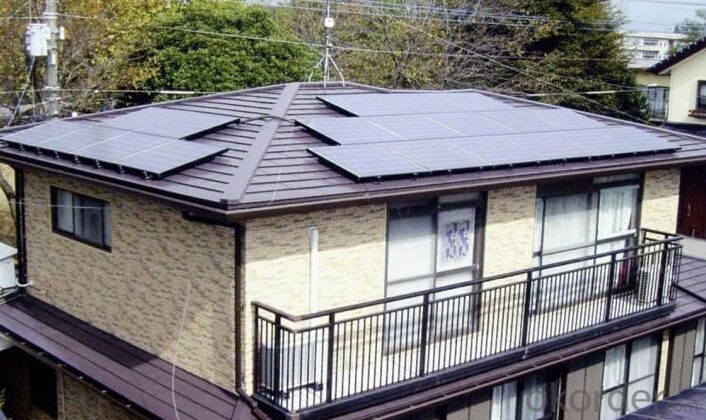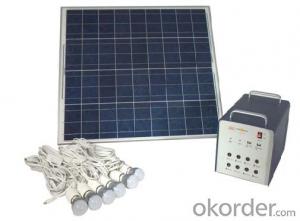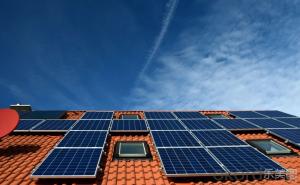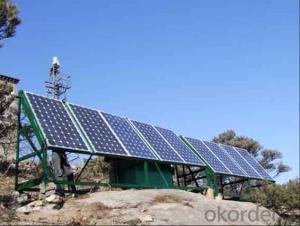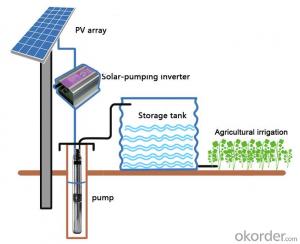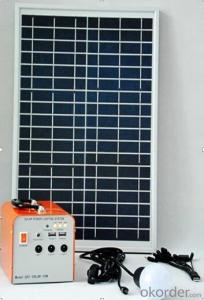Ay Yildiz Solar Energy Systems - 10kW Solar System
- Loading Port:
- China Main Port
- Payment Terms:
- TT or LC
- Min Order Qty:
- -
- Supply Capability:
- -
OKorder Service Pledge
Quality Product, Order Online Tracking, Timely Delivery
OKorder Financial Service
Credit Rating, Credit Services, Credit Purchasing
You Might Also Like
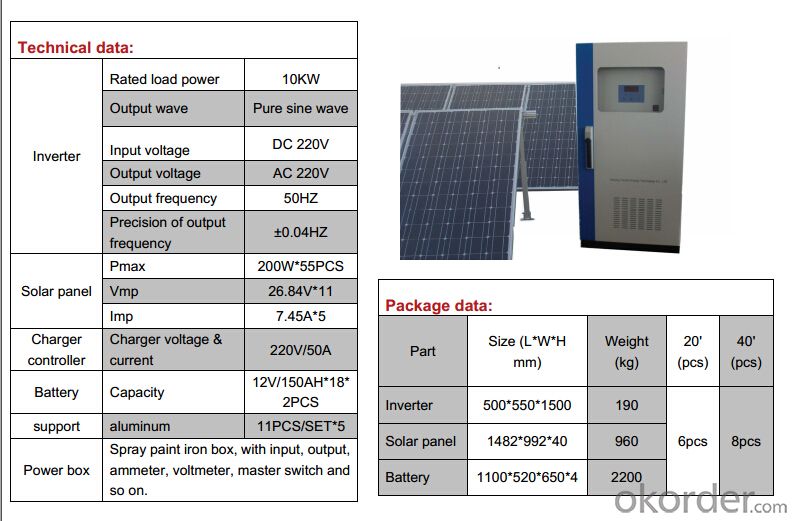
- Q: Can solar energy systems be used for powering electric cars or buses?
- Yes, solar energy systems can be used to power electric cars or buses. Solar panels can be installed on the roof or other surfaces of vehicles to harness sunlight and convert it into electricity. This electricity can then be used to charge the batteries of electric vehicles, extending their range and reducing their reliance on conventional power sources. The use of solar energy for transportation can contribute to reducing greenhouse gas emissions and promoting sustainable mobility.
- Q: Is solar energy reliable?
- Yes, solar energy is reliable. Solar panels can generate electricity as long as they are exposed to sunlight, which is abundant and available in most regions. Additionally, solar energy systems have a lifespan of 25-30 years, and with proper maintenance, they can consistently produce power during that period. The advancements in solar technology have also made it more efficient and cost-effective, making it a reliable source of renewable energy for both residential and commercial applications.
- Q: Can solar energy systems be used for powering oil and gas extraction operations?
- Yes, solar energy systems can be used for powering oil and gas extraction operations. By utilizing solar panels, the sun's energy can be harnessed and converted into electricity to power various equipment and machinery involved in the extraction process. This not only reduces the reliance on traditional fossil fuel-based energy sources but also helps in minimizing the carbon footprint and promoting sustainable practices in the oil and gas industry.
- Q: Can solar panels be installed on floating platforms or buoys in bodies of water?
- Yes, solar panels can be installed on floating platforms or buoys in bodies of water. Floating solar, also known as floating photovoltaic (FPV) systems, are becoming increasingly popular due to their numerous advantages such as increased energy production, reduced land usage, and minimized water evaporation. These platforms or buoys are designed to withstand water conditions and can be installed in lakes, reservoirs, and even offshore.
- Q: What is the impact of temperature on the efficiency of a solar energy system?
- The temperature greatly affects the efficiency of a solar energy system. As the temperature rises, the efficiency of solar panels decreases. This is because of how the semiconductor materials used in solar cells behave. When solar panels are exposed to sunlight, they absorb photons and convert them into electricity. However, as the temperature increases, the resistance of the semiconductor material also increases, which leads to a decrease in the flow of current. This phenomenon is called the temperature coefficient of power. The temperature coefficient of power is usually expressed as a percentage per degree Celsius and varies depending on the type of solar panel technology. Most solar panels have a negative temperature coefficient, meaning their efficiency decreases as the temperature rises. On average, solar panel efficiency can decrease by around 0.5% to 0.8% for every degree Celsius increase in temperature. Moreover, increased temperatures can cause thermal losses within the system. The heat can accumulate in the solar panels, further reducing their efficiency. This is particularly true in hot climates or when there is high solar irradiance. To address the impact of temperature on solar energy system efficiency, various strategies can be employed. One common approach is to incorporate cooling mechanisms, such as ventilation or water circulation, to dissipate the excess heat generated by the solar panels. This helps maintain lower operating temperatures and consequently improves overall efficiency. Furthermore, proper system design and installation techniques can also reduce temperature-related losses. For instance, mounting solar panels with sufficient spacing to allow for air circulation can prevent overheating. Additionally, choosing solar panels with lower temperature coefficients can help minimize efficiency losses in high-temperature environments. In conclusion, temperature significantly affects the efficiency of a solar energy system. Higher temperatures can cause a decrease in solar panel efficiency, mainly due to increased resistance in the semiconductor materials. To optimize the performance of solar energy systems, strategies like cooling mechanisms and proper system design should be implemented.
- Q: Can solar energy systems be used in powering street cameras or surveillance systems?
- Yes, solar energy systems can be used to power street cameras or surveillance systems. Solar energy is a sustainable and renewable source of power that can provide a reliable and independent energy supply for street cameras and surveillance systems. By installing solar panels on rooftops or mounting them on poles near the cameras, the panels can capture sunlight and convert it into electricity. This generated electricity can then be stored in batteries, which can be used to power the cameras and surveillance systems even during periods of low sunlight or at night. Using solar energy for street cameras and surveillance systems not only reduces the reliance on traditional power sources but also helps in reducing carbon emissions and minimizing the overall environmental impact. Additionally, solar-powered systems can be cost-effective in the long run as they eliminate the need for expensive cabling and provide a self-sustaining energy solution. Overall, solar energy systems are an excellent choice for powering street cameras and surveillance systems, offering numerous benefits such as sustainability, reliability, cost-efficiency, and environmental friendliness.
- Q: Can solar energy systems be used for powering electric vehicles charging stations?
- Yes, solar energy systems can be used to power electric vehicle charging stations. Solar panels can be installed on the roof or nearby areas of the charging station to convert sunlight into electricity, which can then be used to charge electric vehicles. This allows for a sustainable and renewable energy source to be utilized for powering electric vehicles, reducing dependence on fossil fuels and lowering carbon emissions.
- Q: How do solar energy systems impact the demand for traditional energy sources?
- Solar energy systems reduce the demand for traditional energy sources by providing a clean and renewable alternative. As more solar energy is generated and integrated into the grid, the need for fossil fuels and other non-renewable sources decreases, leading to a decrease in overall demand for traditional energy sources.
- Q: How do solar energy systems impact the local community?
- Solar energy systems can have a positive impact on the local community in several ways. Firstly, they reduce the dependency on fossil fuels, leading to a cleaner and healthier environment. This results in improved air quality and reduced greenhouse gas emissions, mitigating the effects of climate change. Additionally, solar energy systems create local job opportunities in installation, maintenance, and manufacturing. They also contribute to energy independence, reducing reliance on external energy sources and increasing resilience in times of power outages or emergencies. Moreover, solar energy systems can lower electricity costs for residents and businesses, making renewable energy more accessible and affordable. Overall, the use of solar energy systems benefits the local community by promoting sustainability, creating jobs, and providing economic and environmental advantages.
- Q: How do solar energy systems impact the electricity pricing structure?
- Solar energy systems have a significant impact on the electricity pricing structure as they reduce the demand for traditional electricity from the grid. This decrease in demand puts downward pressure on electricity prices, benefiting consumers. Additionally, solar energy systems often generate excess electricity that can be sold back to the grid, further lowering prices. Overall, solar energy systems help to stabilize and lower electricity prices, making them more affordable for everyone.
Send your message to us
Ay Yildiz Solar Energy Systems - 10kW Solar System
- Loading Port:
- China Main Port
- Payment Terms:
- TT or LC
- Min Order Qty:
- -
- Supply Capability:
- -
OKorder Service Pledge
Quality Product, Order Online Tracking, Timely Delivery
OKorder Financial Service
Credit Rating, Credit Services, Credit Purchasing
Similar products
Hot products
Hot Searches
Related keywords

